Introduction
Generative AI is transforming industries by introducing innovative solutions and enhancing productivity.
From creating realistic visuals to automating complex decision-making, generative AI use cases span a wide range of applications, bringing measurable benefits across sectors.
The demand for this technology is evident: the global generative AI development market is projected to grow from $10 billion in 2023 to nearly $110 billion by 2030, a compound annual growth rate (CAGR) of 34% (Grand View Research, 2023).
This rapid expansion is driven by the value generative AI brings to industries like healthcare, finance, and media.
In healthcare, for instance, generative AI development is helping design personalized treatment plans and even predict disease outcomes, which can reduce healthcare costs and improve patient outcomes.
In retail, generative AI development is projected to increase productivity by up to 40% in content creation and product design by 2025 (McKinsey, 2023).
Exploring these generative AI use cases reveals how businesses are harnessing the technology to drive efficiency, creativity, and revenue growth.
Continue reading to know more about the Generative AI development and its use cases across industries.
What is Generative AI?
Generative AI is a type of artificial intelligence that can create new content. Think of it as a machine that can write stories, make art, and design products.
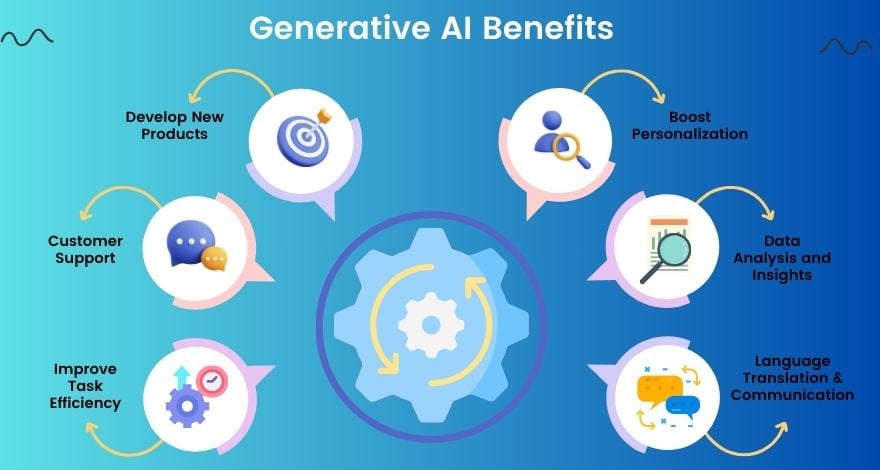
Unlike traditional AI, which often analyzes and recognizes patterns, generative AI uses those patterns to generate something entirely new.
It learns from the data it's given and then uses that knowledge to create original content. This makes it a powerful tool in many fields, from entertainment to healthcare.
Key Features and Capabilities
Generative AI development comes with a host of impressive features:
- Creates New Content: It can generate text, images, music, and even entire videos from scratch.
- Learns Patterns: By analyzing large amounts of data, it understands patterns and structures, which it then uses to create new outputs.
- Adapts to Different Tasks: Whether it’s writing a poem, designing a product, or developing a new recipe, generative AI can adapt to various tasks.
- Improves Over Time: The more data it processes, the better it becomes at creating new content. It continuously learns and refines its abilities.
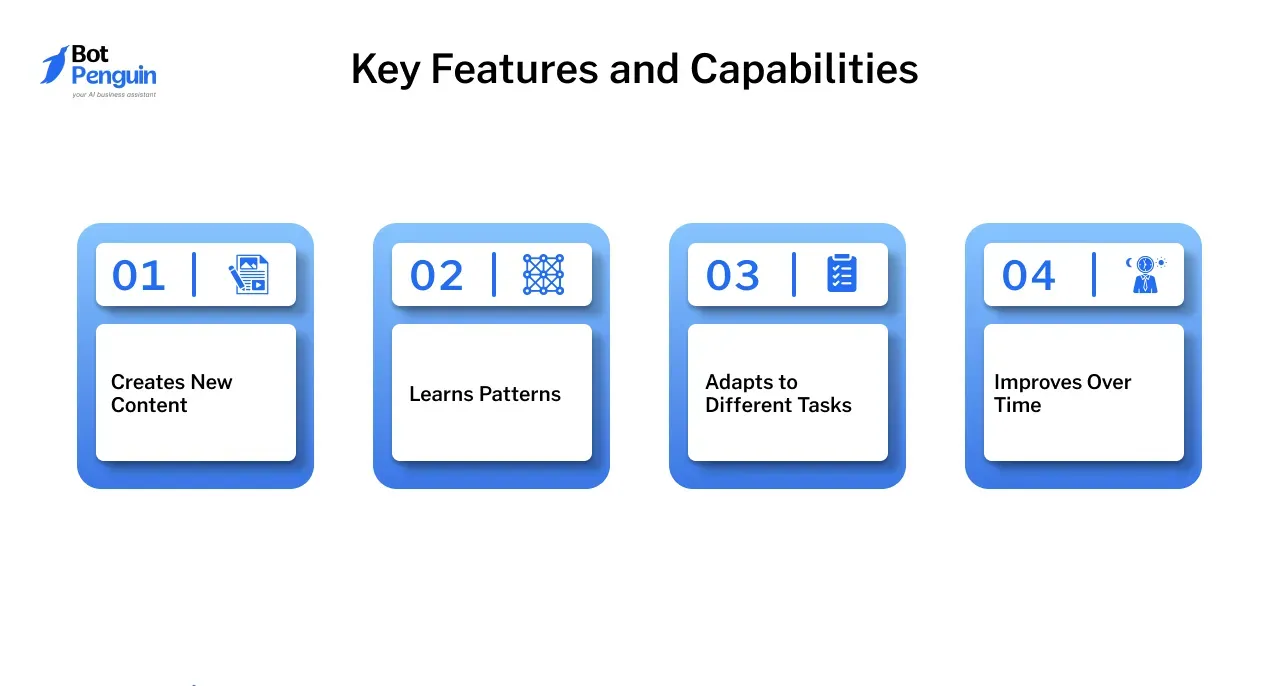
How Generative AI Differs from Other Types of AI
Generative AI development stands out because it doesn’t just analyze data; it creates something new from it. Most AI systems are designed to recognize patterns and make decisions based on those patterns.
For example, a recommendation system on a streaming platform analyzes your viewing habits to suggest new shows.
Generative AI development, however, would take those viewing habits and create a brand new show tailored to your preferences. This ability to innovate and generate new content makes generative AI development particularly exciting.
Generative AI Use Cases Across Industries
Let's dive into how Generative AI is transforming the different industries.
Generative AI in Healthcare
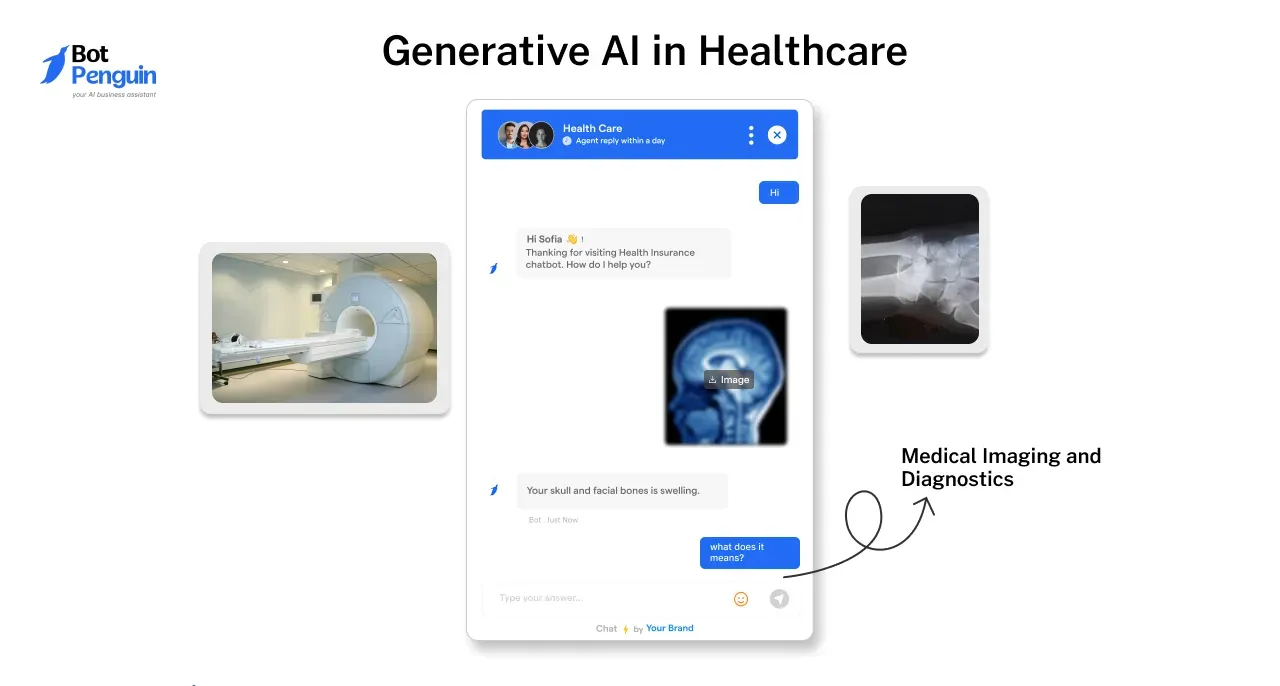
Let's dive into how Generative AI development is transforming the healthcare:
Medical Imaging and Diagnostics
Generative AI development has revolutionized the healthcare sector by improving the accuracy and efficiency of medical imaging and diagnostics.
By using powerful algorithms, generative AI can analyze complex medical images such as MRI scans, X-rays, and CT scans to detect anomalies and provide accurate diagnoses.
Drug Discovery and Development
In the field of drug discovery, generative AI tools are used to analyze vast amounts of biological data to identify potential drug candidates.
By simulating different molecular structures and predicting their interactions with targeted proteins, generative AI development accelerates the drug development process and leads to the discovery of new, more effective treatments.
Personalized Treatment Plans
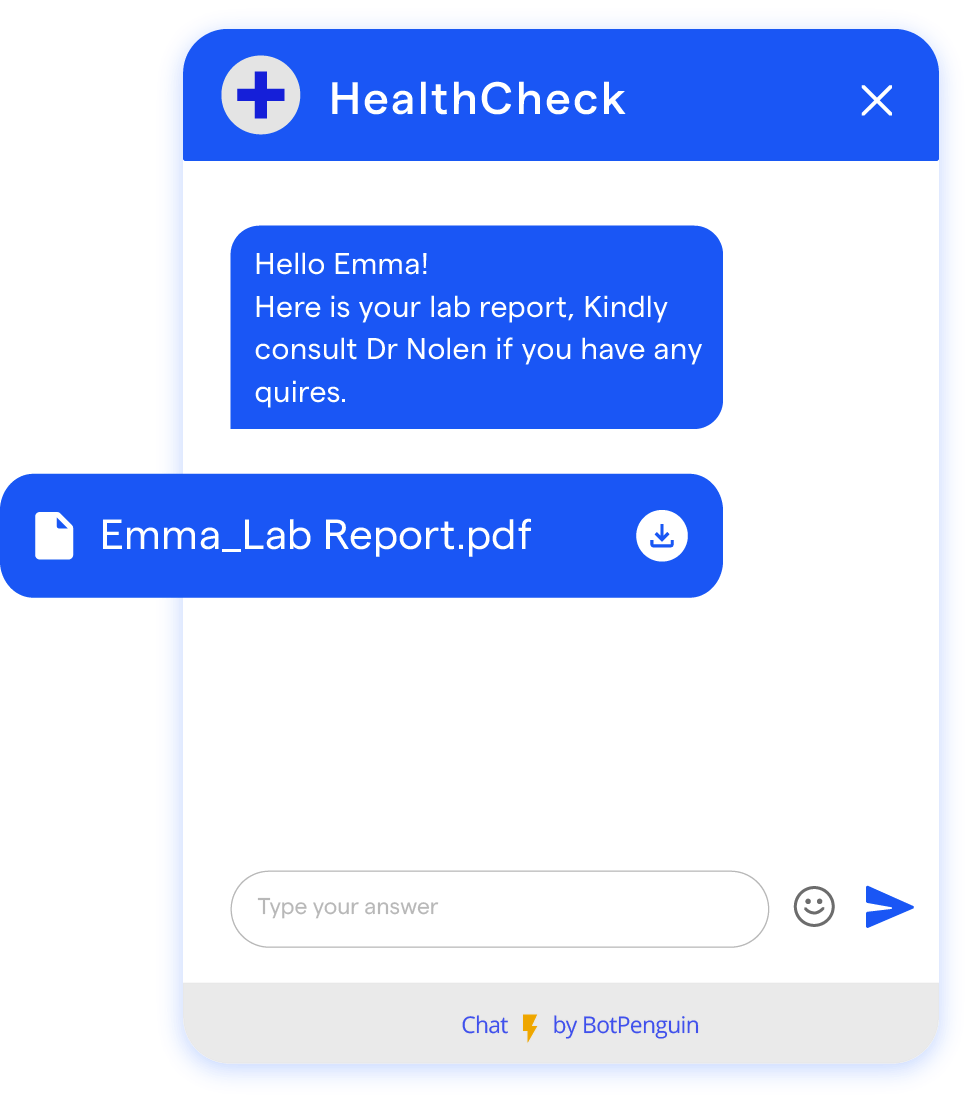
Generative AI development allows healthcare providers to create personalized treatment plans for patients based on their unique genetic makeup, medical history, and lifestyle factors.
By analyzing large datasets and clinical records, generative AI from BotPenguin can recommend the most effective treatment options tailored to each individual.
Case Studies and Examples
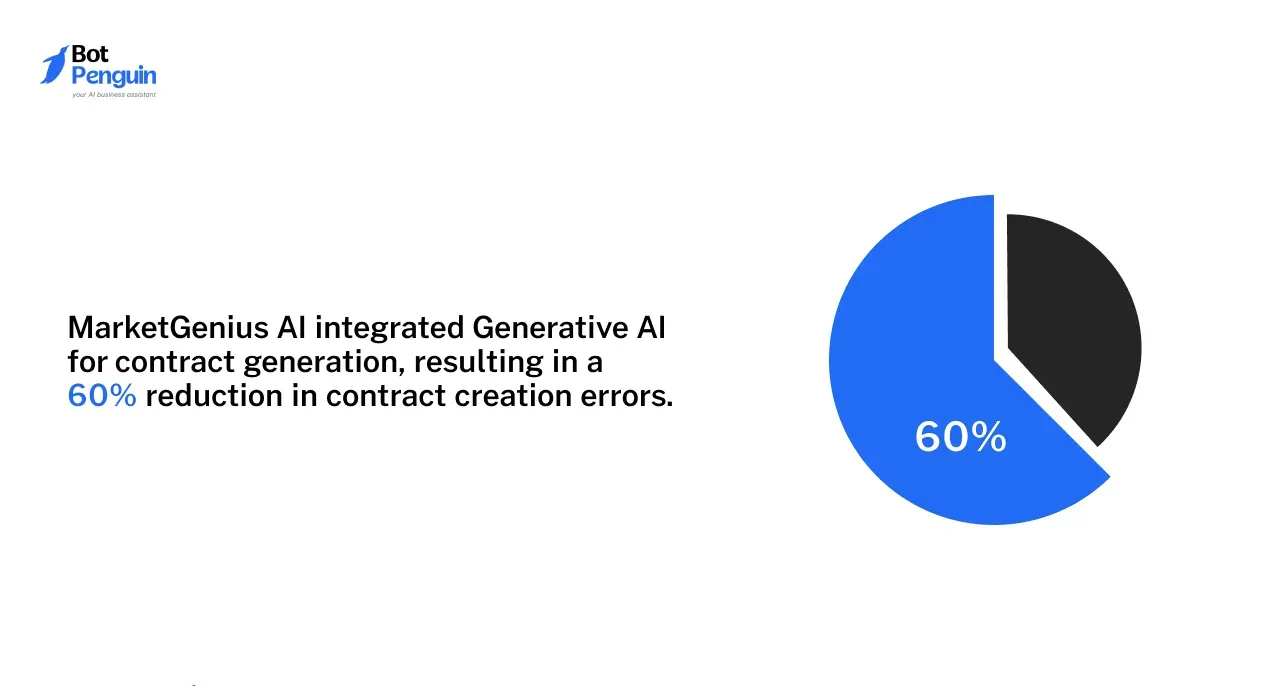
Given below are certain case studies and examples to support the point:
- IBM Watson for Oncology: IBM Watson's generative AI platform is used in oncology to help oncologists make personalized treatment decisions based on patient data and medical literature.
- PathAI: PathAI's generative AI technology is improving the accuracy of pathology diagnoses by analyzing digital pathology images and providing pathologists with precise insights.
- Enlitic: Enlitic utilizes generative AI algorithms to enhance medical imaging analysis and diagnostics, leading to faster and more accurate detection of diseases such as cancer.
Generative AI in Entertainment
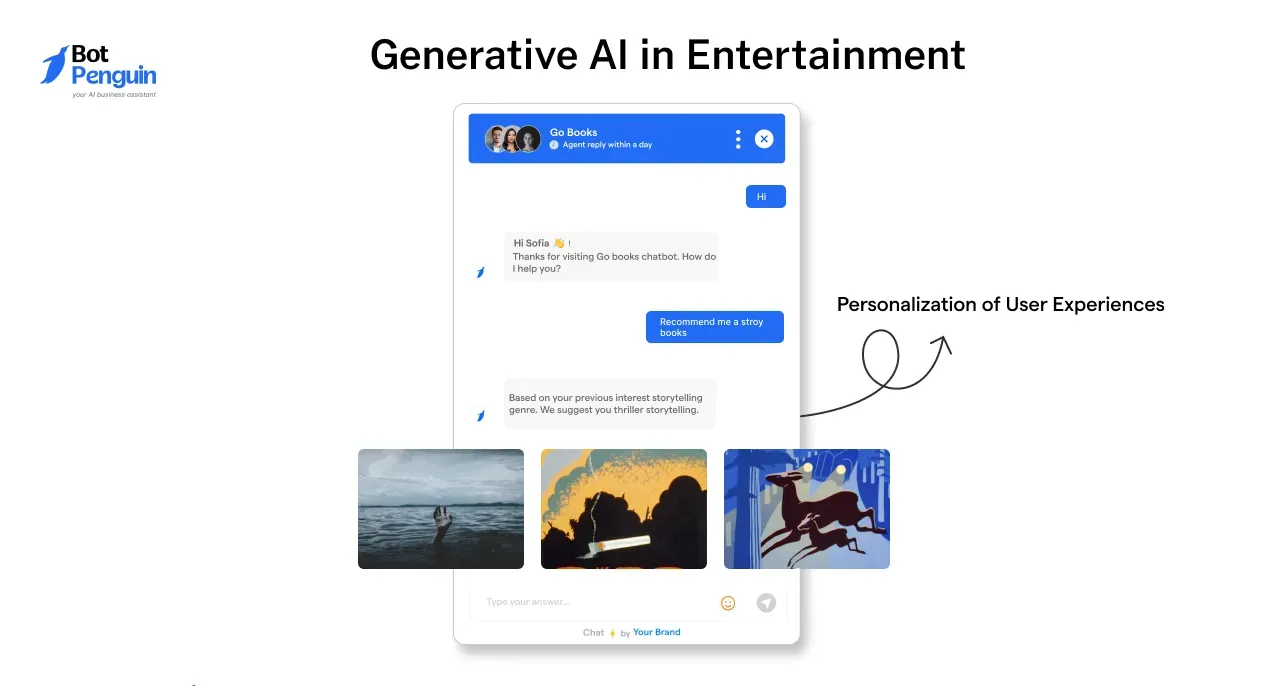
BotPenguin transforms entertainment industry engagement by deploying AI chatbots that create personalized content recommendations, interactive storytelling experiences, and automated fan engagement solutions.
Our platform seamlessly integrates with entertainment platforms to enhance user experience through real-time content curation, ticket booking assistance, and fan community management, all while gathering valuable audience insights for content strategy optimization.
Let's dive into how this innovative technology is transforming the entertainment industry.
Content Creation
Generative AI tools are being used to revolutionize content creation in fields like music, art, and writing. These tools can analyze a massive amount of data to generate new, innovative ideas and content.
For musicians, AI-generated music compositions can provide inspiration and help in the creative process. Artists can use AI to generate new visual art pieces, and writers can benefit from AI-generated ideas for their next novel.
The possibilities are endless when it comes to content creation with Generative AI Development.
Game Development
In the gaming industry, Generative AI development enhances game development. From creating realistic environments to generating challenging levels, AI algorithms are playing a crucial role in shaping the gaming experience for players.
Game developers can use Generative AI tools to automate the process of designing game elements, making it more efficient and cost-effective.
Additionally, AI can analyze player behavior and preferences to personalize the gaming experience, leading to higher engagement and satisfaction.
Personalization of User Experiences
Personalization is key in the entertainment sector, and Generative AI is taking it to the next level. By analyzing user data and preferences, AI algorithms can tailor content and experiences to individual users.
Whether it's recommending personalized music playlists, suggesting movies based on viewing history, or creating custom game levels, AI-driven personalization helps in creating a more engaging and enjoyable experience for users.
This level of personalization enhances user satisfaction and loyalty in the entertainment industry.
Case Studies and Examples
Given below are certain case studies and examples to support the point:
- Magenta Studio: Google's Magenta project uses Generative AI to create music and art pieces. Artists and musicians can collaborate with AI algorithms to explore new creative possibilities.
- AI Dungeon: This text-based adventure game uses AI algorithms to generate interactive storylines based on player input.
Players can experience a unique and personalized gaming experience every time they play.
- Netflix Recommendation System: Netflix uses Generative AI to recommend personalized content to viewers based on their watching habits and preferences. T
his results in higher user engagement and satisfaction with the platform.
Generative AI in Finance
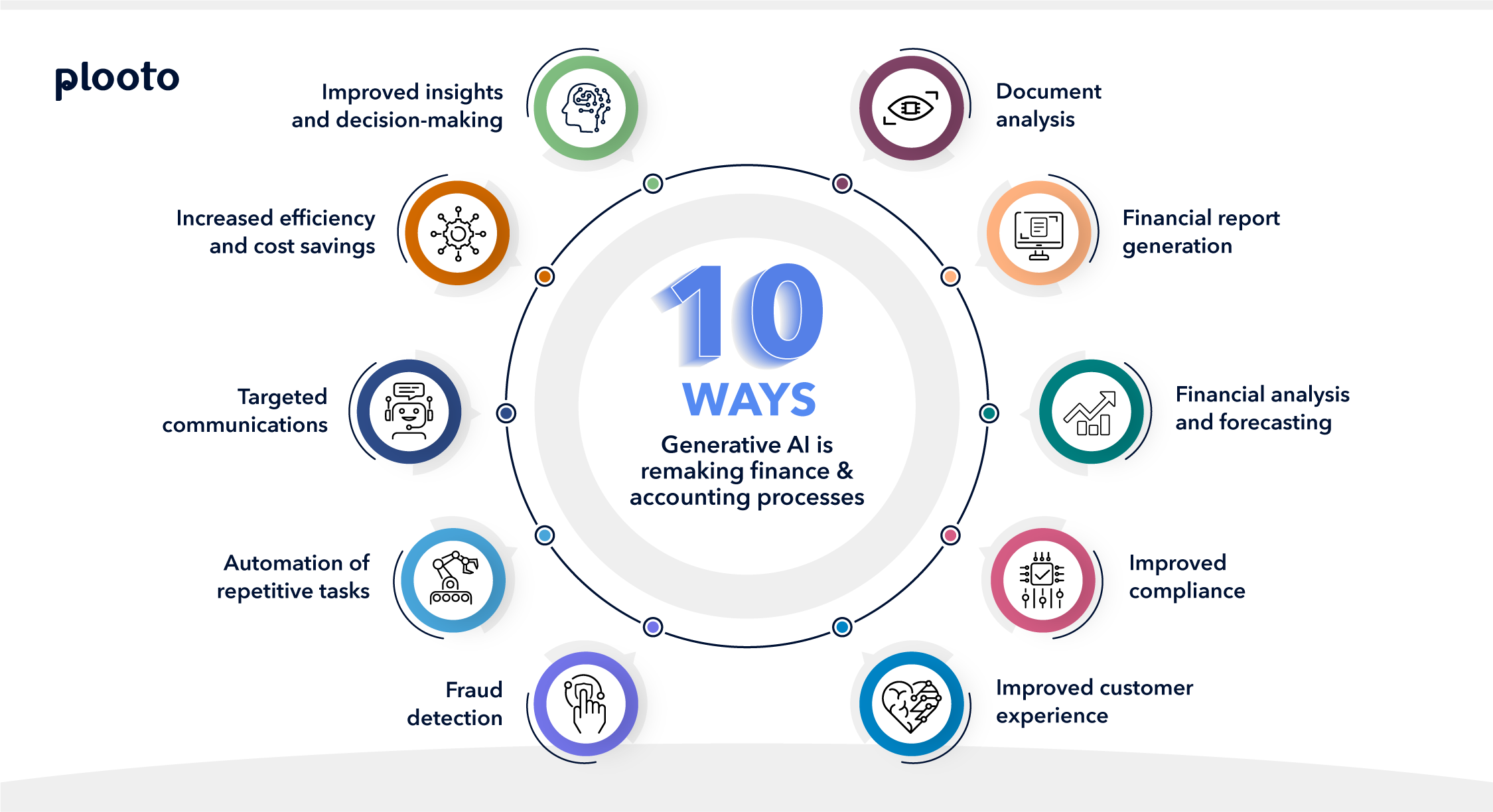
Industry leaders leveraging advanced AI chatbot platforms like BotPenguin have reported significant improvements in customer satisfaction and operational efficiency, with some seeing up to 40% reduction in processing times for routine financial tasks.
As we explore the impact of generative AI across various financial functions, we'll see how these technologies are creating more personalized, efficient, and secure financial services for both institutions and their customers. Let's dive into how generative AI development is transforming the Finance Sector!
Fraud Detection and Prevention
Generative AI development is revolutionizing the finance sector by enhancing fraud detection and prevention capabilities.
By utilizing advanced algorithms, financial institutions can now analyze vast amounts of data to identify suspicious patterns and activities in real-time.
This proactive approach enables organizations to prevent fraudulent transactions before they occur, safeguarding both customer assets and the integrity of the financial system.
Automated Trading and Investment Strategies
Time is of the essence when it comes to generative AI development. Automated trading algorithms powered by AI can analyze market trends, execute trades, and manage investment portfolios with lightning speed and precision.
This not only enables traders to capitalize on market opportunities quickly but also minimizes the risks associated with human error and emotional decision-making.
Suggested Reading:
Role of Generative AI Development in Building Dynamic Chatbots
Risk Assessment and Management
Risk assessment and management are fundamental aspects of the finance industry, and generative AI development is transforming how organizations approach this critical function.
By analyzing complex datasets and identifying potential risks, AI systems can help financial institutions make more informed decisions and mitigate potential losses.
Case Studies and Examples
Given below are certain case studies and examples to support the point:
- JPMorgan Chase: JPMorgan Chase leverages generative AI development for fraud detection, enabling them to identify and prevent fraudulent activities in real-time, saving the company millions of dollars in potential losses.
- Goldman Sachs: Goldman Sachs utilizes generative AI development in automated trading algorithms, enabling them to execute trades swiftly and accurately, resulting in increased profits and minimize risks.
- Wells Fargo: Wells Fargo utilizes generative AI development for risk assessment and management, enabling them to identify and mitigate potential risks proactively, ensuring the stability of their operations.
Generative AI in Marketing
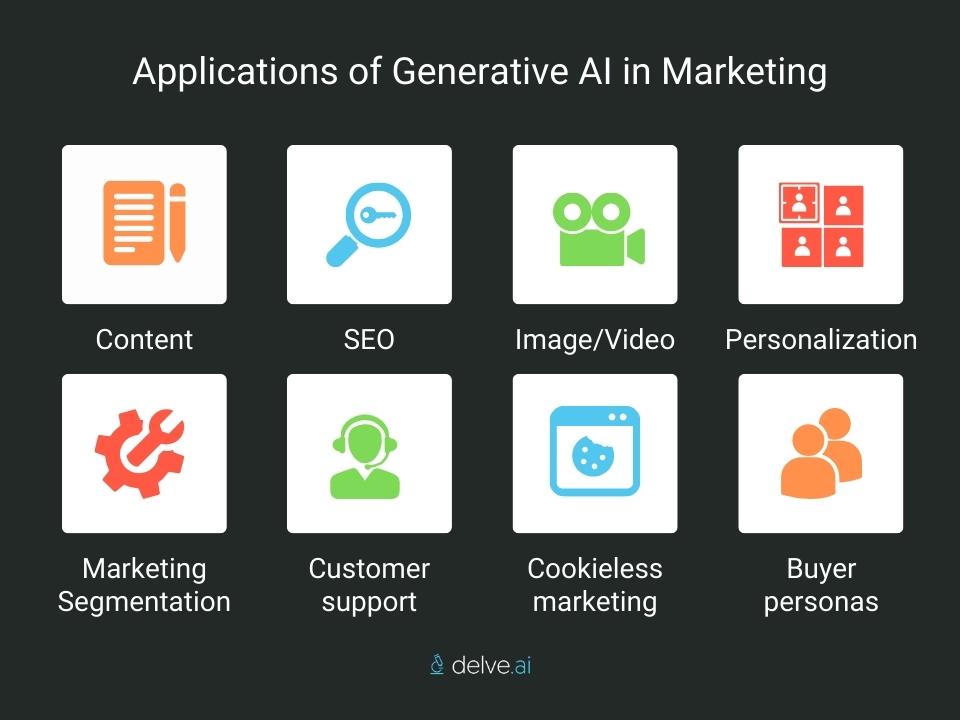
Generative AI brings a whole new level of efficiency and effectiveness to marketing strategies.
Let's dive into how Generative AI development transforms ad copy, content generation, customer segmentation, and campaign optimization in the marketing realm.
Ad Copy and Content Generation
Generating captivating ad copy and informative content is essential in capturing the audience's attention.
Generative AI development makes this process smoother by analyzing data and creating personalized messages that resonate with different customer segments.
It helps in crafting compelling narratives and tailoring content to meet the needs of specific target audiences. This not only saves time but also ensures a higher level of engagement and conversion rates.
Customer Segmentation and Targeting
Understanding customer behavior and preferences is key to successful marketing campaigns. Generative AI development plays a crucial role in segmenting customers based on their demographics, behavior patterns, and interests.
By analyzing vast amounts of data, it can identify unique customer segments and tailor marketing messages to suit their needs. This targeted approach leads to more personalized interactions, higher conversion rates, and ultimately, better ROI.
Suggested Reading:
Unveiling the Power of Generative AI for Marketing
Campaign Optimization
Campaign optimization is essential for staying ahead of the competition. Generative AI aids in optimizing marketing campaigns by analyzing performance metrics, identifying trends, and recommending actionable insights.
It can predict which campaigns are likely to perform well and suggest adjustments to maximize results. This data-driven approach not only saves time and resources but also ensures that marketing efforts are more effective and efficient.
Case Studies and Examples
Given below are certain case studies and examples to support the point:
- MarketGenius AI leveraged Generative AI to analyze customer data and generate personalized ad copy, resulting in a 25% increase in click-through rates.
- MarketAce Solutions utilized Generative AI for customer segmentation, leading to a 30% improvement in conversion rates.
- DigitalBoost Agency implemented Generative AI for campaign optimization, achieving a 15% increase in ROI.
Generative AI in Legal Sector
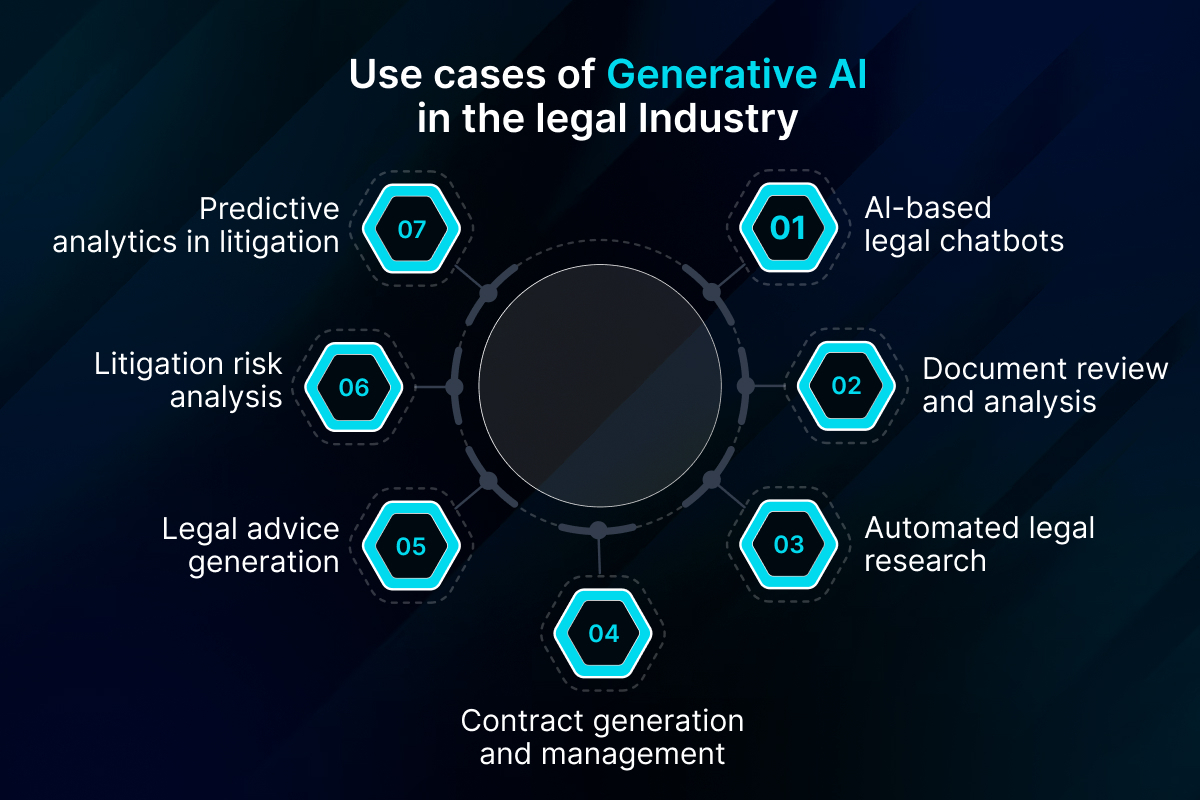
In the legal sector, Generative AI development is making significant strides in transforming various processes.
Let's delve into how Generative AI is revolutionizing document review, predictive legal outcomes, and contract generation in the legal industry.
Document Review and Analysis
Generative AI development is proving to be a game-changer in document review and analysis for legal professionals.
By leveraging natural language processing capabilities, Generative AI can sift through vast amounts of legal documents quickly and accurately.
This not only saves valuable time but also reduces the potential for human errors in the review process. Legal firms can now streamline their operations and focus on more strategic tasks by utilizing Generative AI for document review and analysis.
Predictive Legal Outcomes
Predicting legal outcomes is a crucial aspect of the legal sector, and Generative AI is enhancing this capability.
By analyzing historical legal data and case precedents, Generative AI can provide insights into potential legal outcomes. This empowers legal professionals to make more informed decisions and strategize their approach based on the predicted outcomes.
With Generative AI, legal firms can improve their success rates and better serve their clients by leveraging predictive analytics.
Suggested Reading:
7 Innovative Ways Generative AI Apps Boost Business Productivity
Contract Generation and Management
Another area where Generative AI is proving invaluable in the legal sector is contract generation and management.
Creating and managing contracts can be a time-consuming and error-prone process, but Generative AI development streamlines this workflow.
By automating the generation of contracts based on predefined templates and legal standards, generative AI development ensures accuracy and compliance.
Legal firms can now expedite the contract creation process and maintain consistency across their contract management practices.
Case Studies and Examples
Given below are certain case studies and examples to support the point:
- LegalEase Innovations implemented Generative AI for document review, reducing review time by 40%.
- A law firm used Generative AI for predictive legal outcomes, leading to a 25% increase in successful case resolutions.
- MarketGenius AI integrated Generative AI for contract generation, resulting in a 60% reduction in contract creation errors.
Generative AI in Real Estate
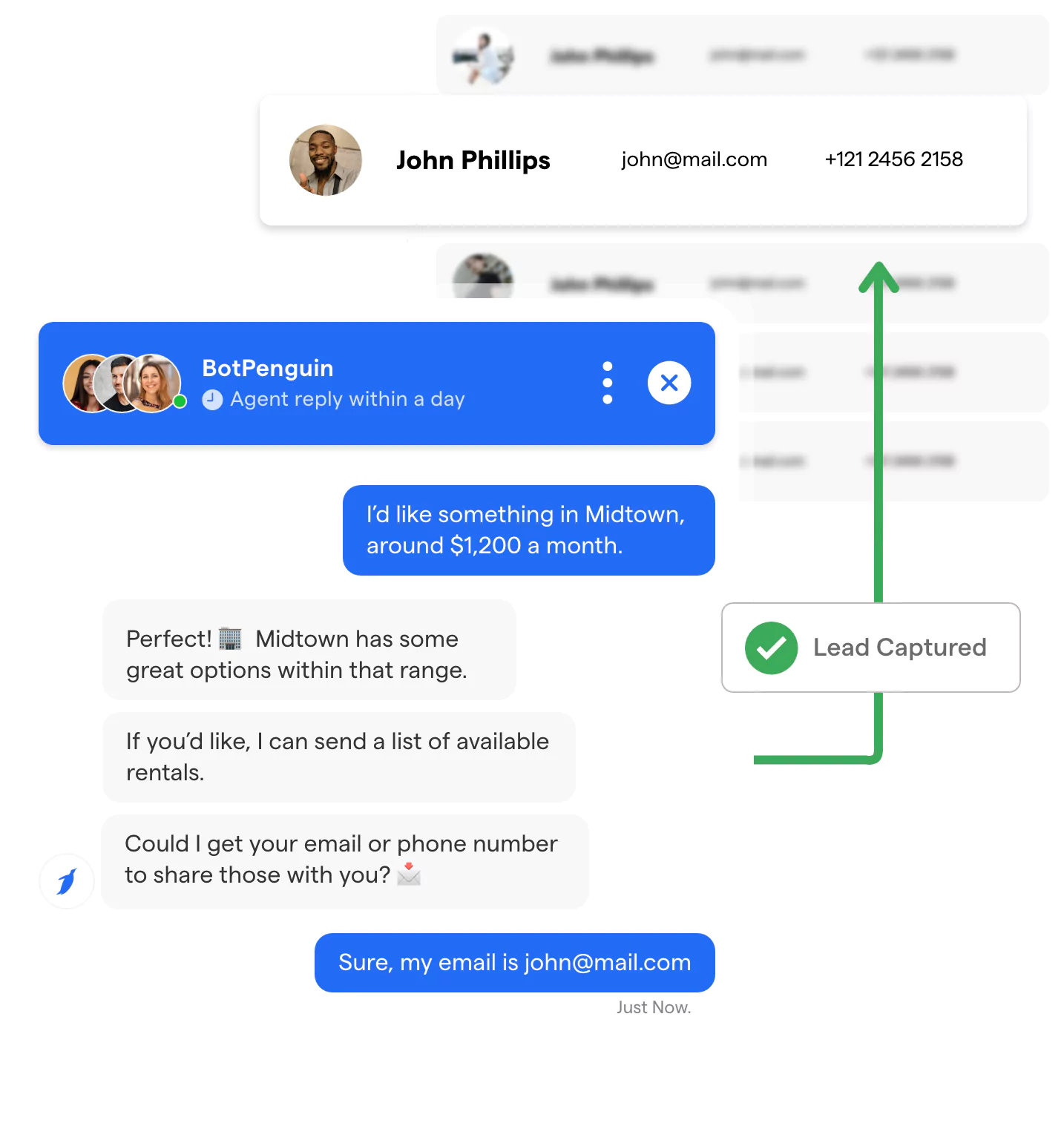
In the real estate industry, generative AI development is revolutionizing the way properties are managed, marketed, and interacted with.
Leading real estate agencies utilizing advanced chatbot platforms like BotPenguin have reported dramatic improvements in lead qualification and client engagement, with some experiencing up to 65% faster response times to property inquiries and a 45% increase in qualified leads.
As we delve into the applications of generative AI across the real estate sector, we'll explore how these intelligent solutions are creating more dynamic, responsive, and profitable opportunities for real estate professionals while delivering superior experiences for property buyers and sellers alike.
Property Valuation and Market Analysis
Generative AI development analyzes vast amounts of real estate data to provide accurate property valuations and market insights.
By considering factors such as location, size, amenities, and market trends, AI algorithms can generate precise valuations, helping both buyers and sellers make informed decisions.
Virtual Tours and Staging
Generative AI creates immersive virtual tours and staging experiences for properties, allowing potential buyers to explore homes from the comfort of their own devices.
By leveraging 3D modeling and virtual reality technologies, AI-powered tours provide a realistic and detailed view of properties, enhancing the buying experience and saving time for both buyers and real estate agents.
Customer Interaction and Management
Generative AI enhances customer interactions in the real estate sector by providing personalized property recommendations, answering queries, and facilitating seamless communication between agents and clients.
AI chatbots can engage with potential buyers, qualify leads, and schedule property viewings, improving the overall customer experience and increasing efficiency in the sales process.
Case Studies and Examples
Given below are certain case studies and examples to support the point:
- VirtualHomes implemented Generative AI for virtual tours, resulting in a 40% increase in property viewings and faster sales cycles.
- ValuEstimate Pro utilized Generative AI for property valuation, reducing valuation errors by 50% and improving accuracy in pricing homes.
Conclusion
In conclusion, the diverse use cases of generative AI development across industries demonstrate its transformative potential.
From healthcare to finance, manufacturing to creative arts, generative AI development applications are reshaping how businesses operate and innovate.
As organizations seek to harness this technology, partnering with a reputable generative AI development company like BotPenguin can be crucial in navigating the complexities of implementation and maximizing return on investment.
BotPenguin, as a leading generative AI development company, offers cutting-edge solutions tailored to various industry needs. Their expertise in leveraging generative AI development tools enables businesses to unlock new opportunities and streamline operations.
Whether it's creating personalized customer experiences, optimizing supply chains, or revolutionizing product design, the applications of generative AI are vast and continually expanding.
As we look to the future, the importance of staying abreast of advancements in generative AI development cannot be overstated. Companies that embrace these technologies and collaborate with experienced partners like BotPenguin will be well-positioned to lead in their respective fields.
The journey of exploring and implementing generative AI use cases is ongoing, promising exciting innovations and efficiencies across all sectors of the global economy.
Frequently Asked Questions (FAQs)
What is Generative AI development?
Generative AI development is a type of artificial intelligence that creates new content, such as text, images, and designs, from existing data.
It learns patterns and generates innovative outputs, transforming various industries.
How is Generative AI used in manufacturing?
Generative AI in manufacturing is used for product design, predictive maintenance, and supply chain optimization. It speeds up the design process, predicts machine failures, and optimizes supply chains for efficiency and cost savings.
What are the benefits of Generative AI development in education?
In education, generative AI development personalizes learning experiences, automates grading, and creates educational materials.
It tailors lessons to individual students, saves teachers time, and provides valuable resources for effective teaching.
How does Generative AI development improve marketing strategies?
Generative AI development enhances marketing by creating personalized ad content, segmenting customers, and optimizing campaigns.
It analyzes customer data to tailor messages and improve engagement, leading to higher conversion rates and better marketing outcomes.
What impact does Generative AI development have on the legal sector?
Generative AI development streamlines legal processes by reviewing documents, predicting legal outcomes, and generating contracts.
It saves time, reduces errors, and helps lawyers prepare better strategies, improving efficiency in the legal field.
What future applications are expected for Generative AI development?
The future of generative AI includes advancements in creative arts, scientific research, and space exploration.
Emerging technologies will enhance AI's capabilities, offering innovative solutions across various industries, driving growth and efficiency.



